Center for Health Equity Newsletter
May 2021

In this newsletter:
Greetings from the Center for Health Equity
Message from the Director
CONNECT: A Tale of COVID-19 testing in two cities
STRENGTHEN: A Minnesota story of resiliency and power: Black Nurses Rock
AMPLIFY: Rushing toward a crisis: the Native American Community Clinic
Greetings from the Center for Health Equity
In April, the nation witnessed the killing of black folks by police officers yet again. We grieve with Daunte Wright’s and Ma’Khia Bryant’s families and stand in solidarity with our African American community. For Daunte Wright and Ma’Khia Bryant to be killed during the Chauvin trial speaks to the long road we have ahead of us in reimagining community safety, justice, and policing in this country.
It has been almost a year since George Floyd was murdered, and we have seen uprisings and calls for justice around the world. When the verdict was released, when we heard that Chauvin was found guilty on all 3 charges, there was relief, joy, and tears for many of us. It was heartening to see people gathering at George Floyd square and being in community with each other. Chauvin is being held accountable for his actions, which is needed progress, but this is not justice. Mr. Floyd should still be with us today. Our fight is not over. We need to continue the fight for justice and work to build anti-racist systems.
While we grieve these injustices, we would also like to wish everyone a happy Asian American and Pacific Islander (AAPI) month! We encourage you to support AAPI businesses, celebrate the rich diversity within the larger AAPI community, learn more about AAPI history, and educate yourself on the myth of the model minority. Additionally, we would like to acknowledge the COVID-19 crisis that is unfolding in India and are sending peace and comfort to our South Asian community during this time.
 These past few months have been hard for our Center for Health Equity (CHE) team. It is with a heavy heart that we share the sad news that our dear colleague and friend Darwin Gonzalo Flores Trujillo passed away at the end of February. He has been part of the MDH family since 2013. He started his career in the financial management division and then moved to rural health before working with CHE and supporting our work through the COVID response. He was passionate about working with people and improving the social and economic wellbeing of all communities, while also enjoying working with the financial side of the department. He loved his family, soccer and Ecuador. We miss him dearly.
These past few months have been hard for our Center for Health Equity (CHE) team. It is with a heavy heart that we share the sad news that our dear colleague and friend Darwin Gonzalo Flores Trujillo passed away at the end of February. He has been part of the MDH family since 2013. He started his career in the financial management division and then moved to rural health before working with CHE and supporting our work through the COVID response. He was passionate about working with people and improving the social and economic wellbeing of all communities, while also enjoying working with the financial side of the department. He loved his family, soccer and Ecuador. We miss him dearly.
Lastly, please join us in saying farewell to our Director, Kou Thao. Under his leadership, the Center for Health Equity has grown and thrived. His vision for the CHE’s mission to “connect, strengthen and amplify health equity efforts” will continue to help ground the work and scope of the Center moving forward. In the past year, Kou has spent countless hours working to build equity into the state’s COVID response and securing funding for community response initiatives from testing to vaccination. He is a trusted advocate and ally and is seen as an authentic leader by internal and external partners. He will be greatly missed. Kou, we wish you all the best, and you will always be a part of our CHE family!
Please share the following opportunity to join our CHE team with your networks: Director of Center for Health Equity, Health Program Manager Senior - Job Opening ID 45631. The application period will close on June 7, 2021.
Interested in being a guest writer for a future newsletter?
Email your idea to health.equity@state.mn.us and we will be in touch!
Message from the Director
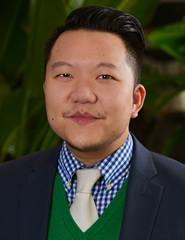 It is bittersweet to write this message. Friday, May 14 marks my last day as Director of the Center for Health Equity at MDH and also marks four years since I embarked upon this journey with all of you. In these last four years we have built upon the legacy of MDH’s Office of Minority and Multicultural Health, which has existed for over 20 years, to create a strong and vibrant Center for Health Equity. Some highlights of the Center over the past four years:
It is bittersweet to write this message. Friday, May 14 marks my last day as Director of the Center for Health Equity at MDH and also marks four years since I embarked upon this journey with all of you. In these last four years we have built upon the legacy of MDH’s Office of Minority and Multicultural Health, which has existed for over 20 years, to create a strong and vibrant Center for Health Equity. Some highlights of the Center over the past four years:
- Publishing our EHDI impact report, Cultivating a Health Equity Ecosystem: Lessons Learned from the Eliminating Health Disparities Initiative, is a groundbreaking report which emphasizes the impact of consistent funding and support of community-driven solutions, as well as the need for institutions of power to (re)assess their role in uplifting or polluting the health equity ecosystem;
- Quadrupling the size of the Center for Health Equity from three to 12 staff in four years;
- Leading the training of all 1,600+ MDH staff statewide in a half-day racial and health equity training to create common language and understanding of our collective role in addressing inequities;
- Hosting the 2019 Health Equity Summit, which spurred the creation of the Health Equity Leadership Network;
- Numerous initiatives which centered communities most impacted to address long-standing health disparities, such as infant health and early childhood development;
- Catalyzing the transformation of how MDH does business by embedding equity into all we do; and
- Creating MDH’s Health Equity Advisory and Leadership (HEAL) Council to hold ourselves accountable to communities most impacted.
The COVID-19 pandemic laid bare the inequities that remain alive and thriving within our systems and institutions. This made it ever more critical that MDH embed equity across our COVID response from day one. Equity continues to be central to our community testing and vaccine work. This work does not stop with my departure. We have a committed team of health equity champions across MDH who will continue to march forward.
It has been a pleasure to serve the state of Minnesota over the past four years and throughout the pandemic. I am excited to see a new leader come into this role and continue to build on the foundation and legacy of MDH’s nationally renowned Center for Health Equity and Office of Minority and Multicultural Health.
With deep gratitude,
Kou Thao
Director, Center for Health Equity
CONNECT
We are a network hub – leading, connecting and strengthening networks of health equity leaders and partners across MDH and Minnesota communities.
This article is part of a series of stories about community outreach and partnership in response to the COVID-19 pandemic. Learn more and find more stories on the COVID-19 Stories of Community Outreach and Partnership page.
A tale of COVID-19 testing in two cities – state, local, and community partnership
When COVID-19 cases first arrived in Minnesota, Mateo Frumholtz, an epidemiologist at the Minnesota Department of Health (MDH), jumped in to volunteer on the weekends fielding hotline calls and helping with contact tracing and case investigation. He began to notice increasing numbers of cases in Spanish-speaking communities as well as outbreaks at food manufacturing and processing plants where many workers are members of the Latinx community. It was “clear there was a need for more infrastructure for language services to help support and engage the [Latinx] community,” Frumholtz said.
One specific community experiencing COVID-19 outbreaks was Watonwan County. Naomi Ochsendorf, Watonwan County’s Human Services Director, recalled that she “saw spikes in the COVID-19 case data late summer, particularly from our food plants.” Ochsendorf started ‘’immediately having conversations with the food plant leadership and epidemiologists to address the high levels of COVID-19 spread.” It was not long before Watonwan County decided to hold community testing events at Madelia and St. James, two cities in Watonwan County just 20 minutes apart from each other.
As there was no existing infrastructure for large-scale testing in Watonwan County, Ochsendorf reached out to MDH, where Frumholtz and Marisol Chiclana-Ayala were working to stand up a team internally under the Cultural, Faith, and Disability Communities Branch to serve the Latinx/Hispanic community and bring their concerns to the forefront of MDH. Together they looked to the State Emergency Operations Center (SEOC) for support in setting up COVID-19 testing sites in Watonwan County. At the time, the SEOC had already been hosting community testing events, but were having difficulty encouraging their communities of focus to come get tested. Ochsendorf, Frumholtz, and Chiclana-Ayala knew that the community engagement approach to the Madelia and St. James community testing sites needed to be different from what was already being done.
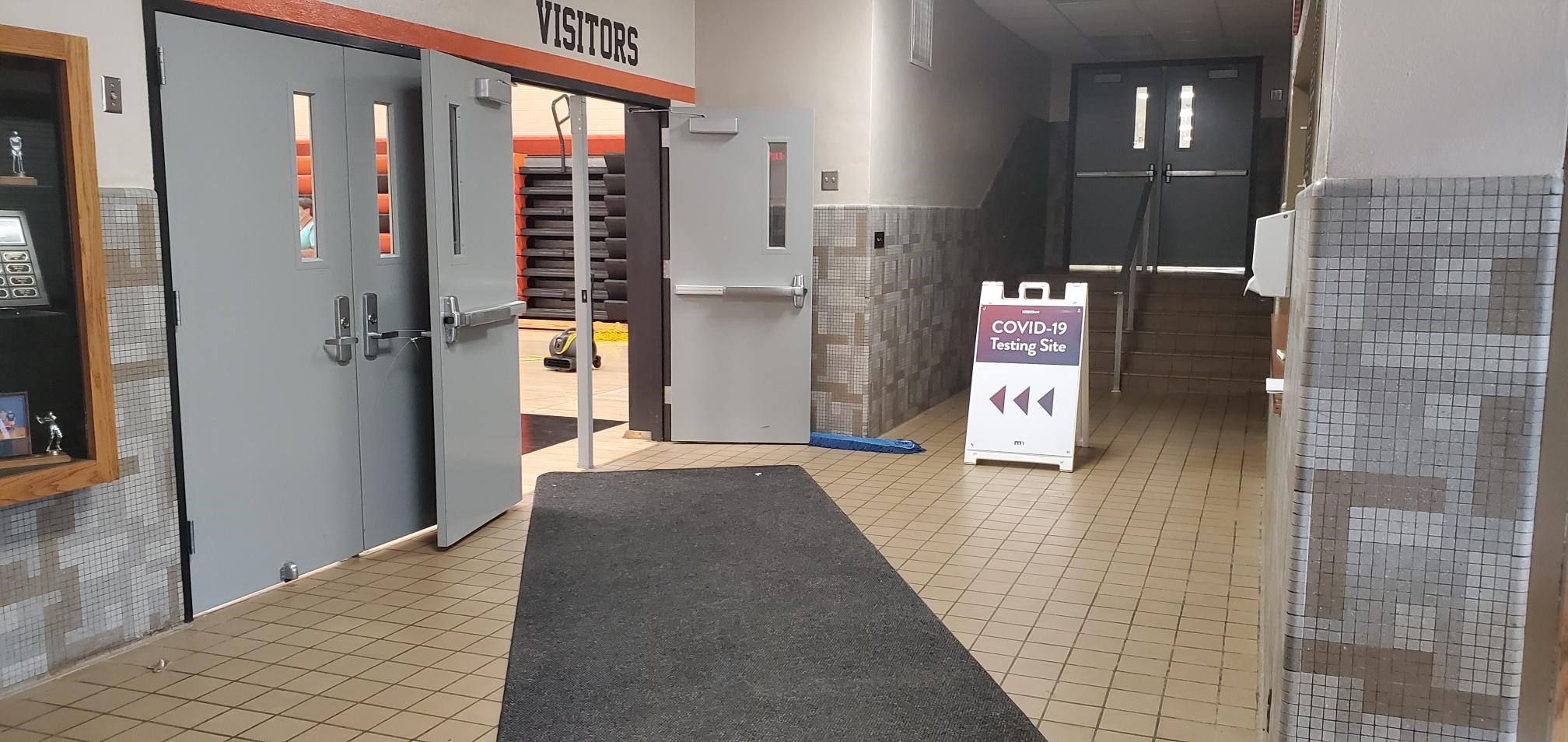
A collaborative organizing effort
From the very beginning, the Madelia and St. James testing events were community focused and driven. Chiclana-Ayala noted that even before the testing events, the MDH team had begun to “build genuine relationships and engage authentically with organizations working with Latinx/Hispanic communities statewide.” These organizations include Comunidades Latinas Unidas En Servicio (CLUES), Hispanic Advocacy and Community Empowerment Through Research (HACER), and Casa de Esperanza. Through these existing relationships, Chiclana-Ayala and Frumholtz were connected to Convivencia Hispana, an organization serving the Latinx community in Watonwan County.
As luck would have it, Convivencia Hispana and Watonwan County local public health already had a long-standing relationship. Ochsendorf said, “Watonwan County’s local public health had been working with Convivencia Hispana since the birth of the organization and many of their staff sit on each other’s boards.” With an existing relationship between Convivencia Hispana and local public health, MDH stepped in to offer the final missing piece: ensuring the logistics of the testing events would run smoothly. MDH and the SEOC coordinated with the food processing plants to make sure testing sites would be open during times when shifts were changing, ensure the sites were accessible to community members, and reduce barriers to testing for the Latinx community.
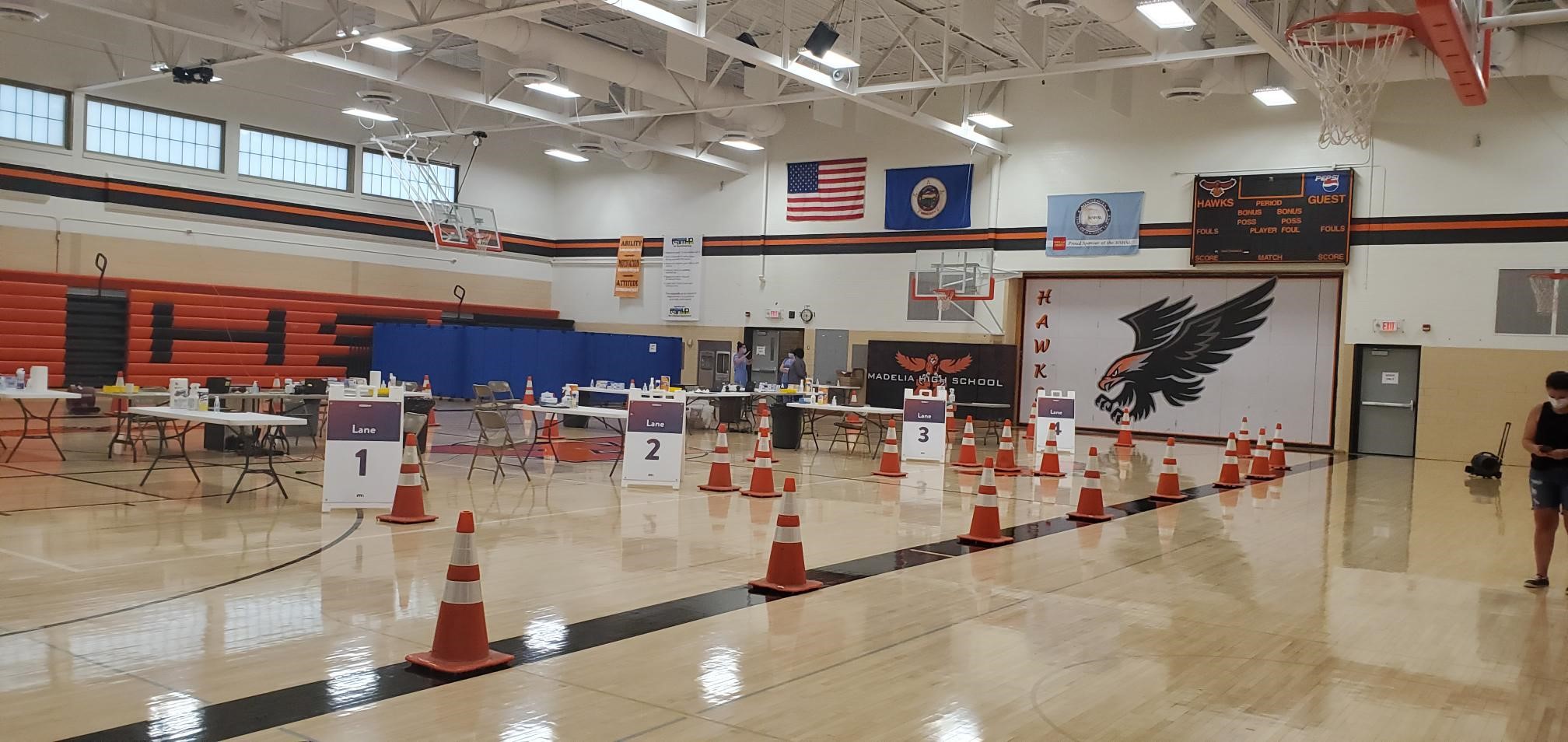
Relationships ensure success
“Watonwan public health and Convivencia Hispana were essential to the success of the two testing events,” Frumholtz stated. Local public health and Convivencia Hispana worked tirelessly to engage the community and encourage them to come get tested. “They even gave out their own phone numbers so people in the community could call them for COVID-19 testing registration,” Ochsendorf said. Chiclana-Ayala observed, “Community members called to register only because trusted community leaders asked them to call. We were so lucky that we met community leaders in Madelia and St. James that believed in us and backed us up. They chose to work with us, and we were so lucky to have that opportunity.”
While there were definitely hectic moments putting together the testing events, Frumholtz emphasized that because of existing stakeholder relationships, “the challenges we faced were not as burdensome once they were able to overcome the first trust barrier.” Because of the wonderful relationships and robust systems already in place, the Madelia and St. James testing events were a huge success, with many members of the local Latinx community coming out to get tested. More than a third of people tested in St. James were from the Latinx community, and almost half of the people tested in Madelia were from the Latinx community, compared to previous events where fewer than 8% of people tested were from the Latinx community.
The Madelia and St. James community testing events demonstrated the strength and necessity of community partnerships and local public health in reaching our diverse communities. This model has continued in Watonwan County for COVID-19 vaccination: Ochsendorf reported that the relationships local public health has built with the community have been extremely helpful in creating a safe and welcoming space for community members coming in to get vaccinated.
STRENGTHEN
We provide leadership in advancing health equity and cultivate health equity leaders within MDH and across Minnesota communities.
This article is part of a series of stories about community outreach and partnership in response to the COVID-19 pandemic. Learn more and find more stories on the COVID-19 Stories of Community Outreach and Partnership page.
A Minnesota story of resiliency and power: Black Nurses Rock
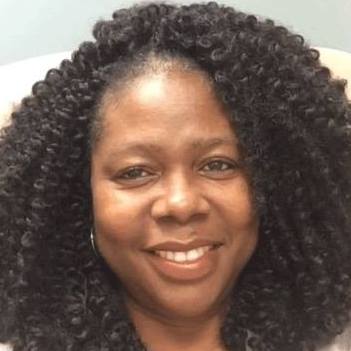 In January 2020, after one and a half years of preparation, Kelly Robinson founded the Minnesota chapter of Black Nurses Rock, Inc., a national organization established in 2014 focused on supporting Black nurses.
In January 2020, after one and a half years of preparation, Kelly Robinson founded the Minnesota chapter of Black Nurses Rock, Inc., a national organization established in 2014 focused on supporting Black nurses.
Then, the COVID-19 pandemic began, and many aspects of our lives came to a standstill. Nevertheless, Robinson knew that Black Nurses Rock’s mission to inspire, empower, and educate the community was more essential than ever during this time. Not to be fazed, Robinson and her team of nurses partnered with the City of Minneapolis to pass out 4,000 masks and 500 bottles of hand sanitizer at community grassroots events. Often, these events popped up without prior marketing; Robinson recounted that she and her team were “literally driving the streets to places where organizers were providing food” to join their efforts and distribute their supply of masks and hand sanitizer to community members.
As spring transitioned into summer, Black Nurses Rock shifted their work from distributing masks and hand sanitizer to doing temperature checks at outdoor events to help keep community members from spreading COVID-19. In June, following the murder of George Floyd, Robinson and her team of nurses were the official temperature takers at his funeral. And as summer came to an end, Black Nurses Rock saw themselves at the center of another very important endeavor: the launch of community COVID-19 testing sites. Considering the possibility of higher rates of community spread following the anti-racism protests, vigils, and community support initiatives, the state of Minnesota, in conjunction with the Minnesota Department of Health, set up COVID-19 community testing sites. Black Nurses Rock was eager to partner in this work.
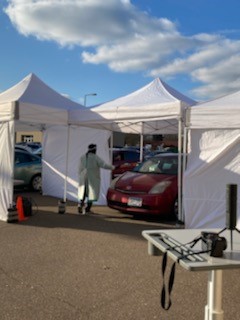 Always a champion of her community, Robinson connected with the state COVID-19 testing workgroup and advocated for more nurses of color to carry out the testing, to increase comfort and trust among community members coming out to get tested for COVID-19. From August through December 2020, Black Nurses Rock and MHealth were the official COVID-19 testers for community testing events hosted by Stairstep Foundation, a trusted organization in the African American community. As a partnership between MDH, Black Nurses Rock, and Ramsey County, these events had a broad reach in the African American community, offering a testing experience where providers were members of the community.
Always a champion of her community, Robinson connected with the state COVID-19 testing workgroup and advocated for more nurses of color to carry out the testing, to increase comfort and trust among community members coming out to get tested for COVID-19. From August through December 2020, Black Nurses Rock and MHealth were the official COVID-19 testers for community testing events hosted by Stairstep Foundation, a trusted organization in the African American community. As a partnership between MDH, Black Nurses Rock, and Ramsey County, these events had a broad reach in the African American community, offering a testing experience where providers were members of the community.
A glimmer of hope: COVID-19 vaccines
As Minnesota marked its one-year anniversary with COVID-19, the rollout of COVID-19 vaccines gained momentum. A few weeks ago, Robinson and her team were asked to help implement a vaccination program for Minnesotans 65 and older as well as K-12 educators. For six 10-hour days, the Black Nurses Rock team gave out over 5,000 vaccinations at two locations in the Twin Cities. The long days were worth it: Robinson said that “people were excited [for their vaccinations] and they all showed up.”
For Robinson, it is all about ensuring that people residing in communities that traditionally do not have easy health care access are prioritized in the vaccine distribution process and that vaccination sites are brought to these communities. “Even if a vaccination site is only twenty blocks away, for elderly people that do not have a car or access to public transportation, that distance is nearly impossible to travel on foot,” she explained. She hopes that as more vaccine becomes available, there will be a more intentional focus on equity.
Addressing hesitancy and building trust
Though COVID-19 testing and vaccination have kept Robinson and her team busy, Black Nurses Rock has still prioritized building trust and addressing vaccine hesitancy with community members. Robinson recently participated in a roundtable discussion with leaders from several different churches, emphasizing the importance of having prior positive relationships and continuing to show up for the communities to establish trust. She shared that the clergy were “comfortable asking [her] questions that they otherwise wouldn’t have been comfortable asking [anyone else].”
These channels of communication are crucial to conveying accurate information to community members who may be experiencing vaccine hesitancy. Questions and concerns surrounding vaccines are particularly prevalent in Minnesota’s communities of color, due to the long history of trauma and abuse from the medical and public health community. For instance, Robinson noted that some “people are fearful that there wasn’t enough testing” of the vaccines, or “that the vaccine is under emergency use authorization.” In the African American community, Robinson said that many “believe this will be another Tuskegee study.” Recently, Robinson received her COVID-19 vaccine and continues to share her experience and thoughts with the community. She hopes that with time, the African American community will see that everyone around the world is receiving the COVID-19 vaccine and that the vaccine is “not targeted at the African American community to do harm.” She hopes that community members will believe that “this vaccine will save your life.” Robinson’s advocacy and the powerful work of Black Nurses Rock is a strong step toward fostering trust in the COVID-19 vaccine in the African American community – and ultimately, toward ending the pandemic.
AMPLIFY
We amplify the work of communities most impacted by health inequities and support them to drive their own solutions.
This article is part of a series of stories about community outreach and partnership in response to the COVID-19 pandemic. Learn more and find more stories on the COVID-19 Stories of Community Outreach and Partnership page.
Rushing toward a crisis: How one community organization’s ability to pivot was crucial in responding to COVID-19
The Native American Community Clinic (NACC) on Franklin Avenue in Minneapolis provides a full range of health care services, with a dedication to address health disparities within the urban Native American community of the Twin Cities. At the beginning of the pandemic, it quickly became clear that the clinic’s community would be impacted, and because of its role in the community, many expected the clinic to respond.
“People reached out right away,” Dr. Antony Stately, chief executive officer of NACC said. “Community members were calling me, emailing me, and texting me.”
Because of the clinic’s reputation as a key care provider in unsheltered and transient communities, it also was quickly identified by many as an expert in addressing COVID-19 in this community. NACC partnered with the Minnesota Department of Health (MDH), the city of Minneapolis, and South Side Harm Reduction to begin a COVID-19 testing initiative.
For MDH, this was a natural and crucial partnership. “People experiencing homelessness, particularly those [who] are unsheltered, were not able to access testing early in the pandemic,” Blair Harrison, senior advisor on health, homelessness, and housing at MDH said. These communities are at particularly high risk for COVID-19 due to added challenges to social distancing and access to personal protective equipment, like masks. “We knew NACC is a trusted health care provider of the homeless community in Minneapolis and wanted to support their testing efforts,” Harrison said.
With these partnerships in place and with funding from MDH, NACC began testing for COVID-19 in group housing environments and in the transient and homeless communities in Minneapolis. Despite many unanswered questions about the best way to respond to the emerging crisis of COVID-19, clinic staff understood the critical and time-sensitive nature of testing in these communities.
Gregg Harrison, director of operations at NACC, explained that clinic staff and clinicians had “a willingness to jump in when others were more cautious. It’s part of our culture at NACC, a willingness to figure things out as we go. We were willing to just step in and figure it out, because we understood that the risk to the communities we serve is so high.”
Dr. Stately agreed. “We rush toward a crisis. We do a lot of pivoting,” Dr. Stately said. “It makes us unique.”
Success through trusted relationships
The team at the clinic, in partnership with local public health, coordinated several successful testing events. For example, they leveraged their relationships in the transient and homeless community in the Powderhorn neighborhood of Minneapolis to hold an effective testing event.
"The outreach teams at NACC know all those folks, so it is successful at reaching those people and getting them out to testing,” Harrison said.
Between July and December 2020, the clinic tested more than 1,108 members of the transient and homeless community for COVID-19. These community members may not have had access to testing without the tailored outreach they received.
Central to the clinic’s approach is their commitment to go beyond providing excellent health care services. “There’s been an intentional practice to reorient the clinic to own the value of the fact that we serve our relatives,” Dr. Stately said. “These people are our relatives and we have a responsibility to care for them.”
Trust between community members and the clinic was critical to the success of testing events.
A person-centered approach to vaccines
Recently, NACC has been busy providing COVID-19 vaccinations to its communities. It is particularly well-positioned to vaccinate in group homes, shelters, and homeless communities. The clinic continues to take a relational approach as they provide vaccinations.
“We can’t just get people in the door and give them a shot and kick them out,” Dr. Stately said. “There is education and care that needs to happen...We cannot rush the process. We have to take time to build confidence and faith.”
By combining cultural wisdom, strong relationships, and a proactive approach, the clinic continues to be a trusted resource in its community for testing and vaccination during the COVID-19 pandemic.